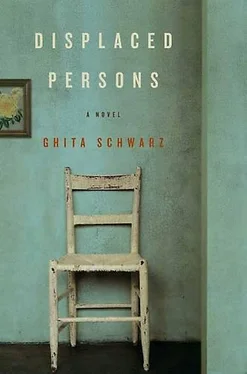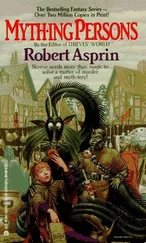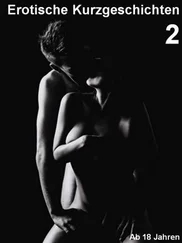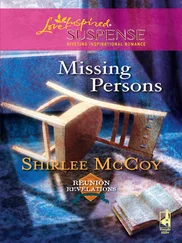Only one mistake! said Pavel, sending Chaim a wink: there had been at least two.
I mean what I say, said Leo. At another time, he really could have made something of it.
His rib cage tight with pride, Chaim managed to say: Like the singer Basia, no?
Not exactly like her, answered Leo, no, that’s something different, and she is young enough, of course, but still, you are a very fine boy, one who can appreciate, who should be exposed-
Later Leo took him aside. My friend, I have been planning a little journey.
Chaim breathed in, expectant, lips pressed together, keeping in the air.
We-myself and Tina, you know-we had a plan to go to a concert in Hamburg. We were to take a couple of children. Basia, of course, will join us. And I thought you too would be interested.
A nervous laugh burst out of Chaim’s mouth. His face felt unnaturally warm, feverish.
Yes, I thought you would like it. Here-Leo handed Chaim a scrap of paper, an advertisement from the newspaper of the town, not the camp. It is the Mozart Requiem , next Saturday evening. We’ll take a car in the morning to Hamburg and stay overnight.
The rest of the morning passed in a wine haze, Chaim sipping freely from a silver cup Pavel had given him as a gift, chewing happily on berry strudels and apple cake, rushing up to kiss Fela, who stood quietly behind the little table of pastries, carefully unloading.
You are pink! laughed Fela.
Pink, yes! answered Chaim. Pink and red! Gold and silver! He was giddy, he felt himself spilling out of his skin, the tune to his haftorah portion, Isaiah’s portion, spinning around and around in his brain. He wanted to keep his news to himself, hold it in, his reward, the small thing that would begin to compensate him for what he had lost. A concert.
THERE HAD BEEN OPPORTUNITY in the ghetto for him to hear a concert-the ghetto orchestra had performed once or twice for free-and when it came time to applaud he had dropped his hands so as better to hear the clapping of the crowd. He loved the sound of it, a huge number of hands improvising together to make their collective percussion. When the rain came through the trees in the forest, he had sometimes thought he could hear applause, the slow building of leaves against one another, a sudden crescendo for the little bow of the soloist, a dying down again until the listeners remembered their hunger and returned to their quarters.
He looked at his hands. A child such as the little singer Basia would clap her hands together, flat. It made more noise, but it would tire the hand out. He had seen someone make the shape of an S with their two hands, bending one hand at the knuckles, pushing the fingers of the other against the first palm. It was a sophisticated clap, softer but less tiring, one that belonged to adults. One, surely, that Tina and Leo would use when the conductor finished and turned to face the German audience.
They would be the only Jews there, no doubt. Well, let this audience see how a refugee appreciated the music of dead Germans.
LEO OBTAINED A SCORE and copied out the lyrics of the requiem in Latin, with a brief German translation to the side. He gave the lyrics to Chaim and little Basia to share. Basia had no patience for reading and seemed not to know written German with any fluency; she looked out the window when Leo left the two of them to study. But Chaim was fascinated. In preparation he scrutinized the Latin words with the hope of memorizing at least some of the sections. He looked for the familiar phrases: Jerusalem was the same for Christians. For Abraham, the Latin was Abrahae . This was what Mozart did when thinking of death. If one looked at it straight one became salt-or died, as Mozart did, in the throes of composing. But look, his wife, his companion, had worked to find men to finish it, to make a little memorial to her own love, her own grief, a vision not of the man she shared her life with but of the things he had made.
Chaim could not translate the Latin words on the page into sounds in his head, and even if Leo had been able to use the phonograph in the Roundhouse, he could not have found recordings of the pieces to be performed. Chaim would have to wait, counting every hour ticking by in the classroom or the house, feeling more and more enclosed in the house, longing to leave and visit the port city where the reconstituted orchestra of the vanquished would give its first performance.
HE HAD PLANNED TO let it out casually, as they ate on Friday evening, so that they would not see it was important to him, but Pavel forced it out sooner, in the morning.
I told Itzik Rakover you would tutor his nephew, Pavel called out from his room. He wants to talk to you on Shabbos.
Ah, said Chaim. I wanted to tell you-
Rakover can’t stop talking about the boy. You know, they took him out from the priests, it’s terrible, the child still crosses himself-
Pavel, said Chaim. Let’s talk with him next week. I’m traveling a little this Saturday.
Hmm? said Pavel, emerging from his bedroom, wrapping his tie around his neck. Chaim was in the corridor.
I will be taking a trip, said Chaim.
A trip? said Pavel. On the Sabbath?
We travel to the camp every week for the service, said Chaim. You have traveled on the Sabbath. So yes, this Saturday I am going to Hamburg instead.
It is different to travel to pray, said Pavel, stiffening. And what, may I ask, calls you to Hamburg?
Ah, repeated Chaim, calm, authoritative, his voice firm and deep-he could make his voice steady, he was a man-I am attending a concert in Hamburg.
Pavel looked at him.
The symphony, repeated Chaim. With Leo Meisel. He has made arrangements for his best students to go.
Pavel paused another moment. Then he said: Out of the question.
Pavel’s voice was not loud, but in the kitchen, where Fela prepared breakfast, the clinking of the plates and silverware suddenly stopped. Chaim turned down the corridor. He would take his coffee, he would have a piece of bread.
Pan Pavel, he called as he walked, it is arranged already. Only for one night.
One night! Pavel’s voice rose. And this you announce with your back to me!
Chaim moved toward Fela, who stood at the stove, and poured himself coffee into a cup. Pavel followed him.
Excuse me, young man, Pavel managed, his voice quieter now, quieter but tense, tight. Where will you stay for one night? In the concert hall? Or will Leo Meisel take you begging at a church?
You stayed in churches in your time, ventured Fela, with a smile, nervous. Come, Pavel, have your coffee.
And for what reason did you keep this from us until now?
I did not keep anything. What did I keep? Chaim swallowed, the coffee burning his mouth. No, he would not become angry. The more furious Pavel grew, the more Chaim wanted to be solid, calm, in control.
You knew, you had these plans! The man did not simply obtain tickets the way he picks up women!
Pavel, Pavel. Fela was humming his name, half afraid, half amused. What? Don’t you have things you do not reveal? Don’t you have things you keep quiet?
Not like this!
Yes like this! Of course like this. Fela touched Pavel’s shoulder.
But Pavel seemed not to notice. Chaim, he said. It is impossible. I need you here.
For one night, Pavel, you do not.
And how do we know this fine scholar will bring you back, all in one piece? Hamburg! There, no soldiers will protect you if something goes wrong.
Pavel, interjected Fela. Let the boy enjoy himself.
You! cried Pavel, turning to her, looking straight at her eyes, his jaw jutting forward, his teeth clenched. And how do you have the authority?
But the teacher, Pavel, it is he who wants to give-
Leo Meisel! Leo Meisel does not run this household!
Читать дальше











